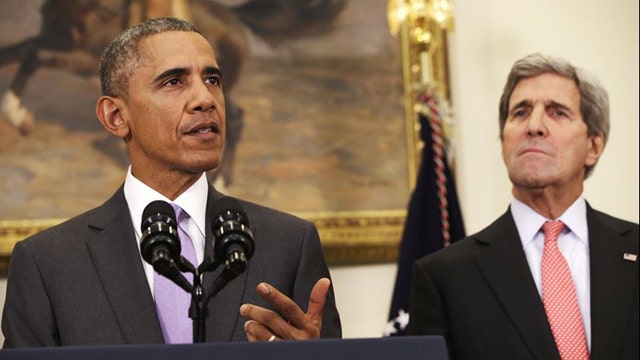The highly touted "framework" for an Iranian nuclear deal, announced Thursday following days of intense negotiations, is being met with mixed reviews on Capitol Hill -- as Republicans voice skepticism and lawmakers on both sides of the aisle reprise demands that Congress have a say.
President Obama, who pitched the framework as “historic,” said he would speak with House and Senate leaders -- he already has spoken briefly with Speaker John Boehner, Fox News has learned. Obama, in the Rose Garden, said the issue is “bigger than politics” and warned that if Congress killed a deal without a reasonable alternative, the United States would be blamed for the failure of diplomacy. He called it a "good deal."
But Boehner, within hours of the announcement, warned that the "parameters" represented an "alarming departure" from initial U.S. goals.
In a statement, Boehner said his "immediate concern is the administration signaling it will provide near-term sanctions relief," referring to a provision calling for U.S. and E.U. sanctions relief once inspectors verify Iran's progress toward the nuclear-related steps of the deal.
"Congress must be allowed to fully review the details of any agreement before any sanctions are lifted," Boehner said.
Obama's warning to Congress and Republicans' early reaction point to a tense few weeks ahead as Capitol Hill lawmakers weigh legislation -- which has been on hold -- demanding congressional review of a nuclear deal, and potentially another bill dealing with sanctions.
Senator Bob Corker, R-Tenn., chairman of the Senate Foreign Relations Committee, said it is important to see the specific details of Thursday’s announcement and said America should remain “clear-eyed” regarding Iran.
“If a final agreement is reached, the American people, through their elected representatives, must have the opportunity to weigh in to ensure the deal truly can eliminate the threat of Iran’s nuclear program and hold the regime accountable,” he said in a written statement.
Corker and Sen. Bob Menendez, D-N.J., sponsored the bill allowing congressional review. A 60-vote threshold would be required before lawmakers could take action. Corker said his committee would take up that legislation on April 14, and said he's "confident of a strong vote."
In a conference call, senior administration officials reiterated concerns about legislation that could derail an Iran agreement but said they are "open to discussions" with Congress on what oversight role they could play. One official said Congress would eventually get a vote, regardless, on whether to lift sanctions.
Menendez, a Democrat who has publicly criticized the Obama administration’s handling of Iran, suggested the White House take its time before agreeing to anything. With the preliminary agreement announced Thursday, negotiators will now try to hammer out a final, comprehensive deal by a June 30 deadline.
“If diplomats can negotiate for two-years on this issue, then certainly Congress is entitled to a review period of an agreement that will fundamentally alter our relationship with Iran and the sanctions imposed by Congress,” Menendez said in a written statement. “The best outcome remains a good deal that ends Iran’s illicit nuclear weapons program. That requires a strong, united, and bipartisan approach from the administration and Congress.”
Earlier Thursday, Menendez pleaded not guilty to 14 federal charges of corruption and bribery that some have called political payback for going against the administration.
Obama's biggest allies, meanwhile, seemed to be giving his diplomatic team some space in the wake of Thursday's announcement. California Democratic Sen. Barbara Boxer seemed cautiously optimistic following the Iran announcement:
“We don’t yet know the details of a final deal, but initial reports are promising, and if the U.S. had prematurely ended talks on nuclear issues in the past, we would never have had historic and critical international agreements like the Nuclear Non-Proliferation Treaty and the New START Treaty.”
Boxer went on to praise the president and his administration for working “tirelessly to reach this point” and vowed to work to “ensure that Congress has the patience to support this diplomatic effort because the risks of walking away from the table are simply too high.”











































